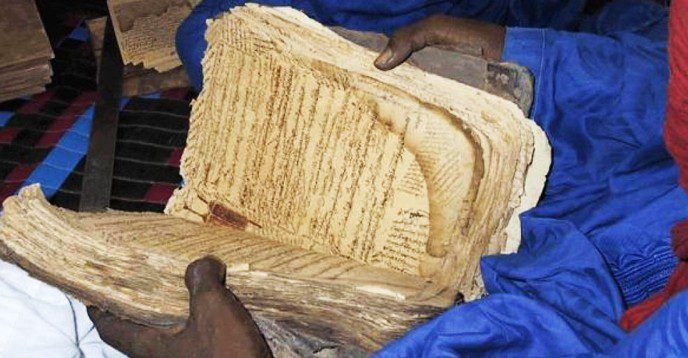Nearly two years after armed groups occupied northern Mali and destroyed cultural heritage there, an international conference will take place in the capital, Bamako, from 28 to 30 January to examine the long-term conservation of the country’s invaluable ancient manuscript collections.
UNESCO’s Office in Bamako, Mali’s Ministry of Higher Education and Scientific Research and the Ahmed Baba Institute of Higher Learning and Islamic Research have organized the conference in partnership with the Malian Ministry of Culture, Crafts and Tourism*.
Entitled “Ancient Manuscripts Facing Modern Day Challenges”, the conference will examine the future of the manuscripts that were smuggled out of Timbuktu in 2012 to Bamako, where they are still kept. Participants will also discuss the historic importance of this fragile heritage and the role of local communities in its safeguarding. The agenda of the conference will also address issues relating to the fight against illicit trafficking and UNESCO’s activities to help preserve the manuscripts;
The many speakers at the event (see programme, in French) include scholars, representatives of cultural institutions, religious and local communities and policy-makers. There will also be a preview of the documentary film, “Sur la piste des manuscripts de Tombouctou” (On the Trail of the Manuscripts of Timbuktu”), at the French Institute of Bamako on 28 January (6 p.m.).
Cultural heritage, including manuscripts, suffered severe damage during the occupation of northern parts of the country by armed groups in 2012 and 2013, and the insurgents burned or stole 4,203 manuscripts held at the Ahmed Baba Institute. Nonetheless, the local population was able to save 90% of these documents, with the help of the non-governmental heritage organization, SAVAMA-DCI, which is a partner of the Conference.
The manuscripts of Timbuktu form a collection of several hundred thousand documents some of which date as far back as the 13th century. They include scholarly and theological works as well as commercial texts. They are written in Arabic and in African languages using different forms of Arabic script.
***
*The conference has been organized with the financial support of Norway with additional contributions from the MINUSMA, Switzerland, the European Union, the United Kingdom and France.
For more information (in French): http://www.cimam-2015.org/
Journalists wishing to cover the conference should request accreditation.
Media contacts: Agnès Bardon (in Paris), UNESCO Press Service, +33 (0) 1 45 68 17 64, a.bardon(at)unesco.org
Oumou Sanogo, UNESCO Office in Bamako, landline + 223 20 23 34 92/93 mobile: +223 79 56 88 17, o.sanogo(at)unesco.or
FRENCH VERSION
Les nombreux orateurs lors de l’événement (voir programme, enFrançais) comprend des universitaires, des représentantsd’institutions culturelles, communautés religieuses et locales etles décideurs. Il y aura aussi une avant-première du filmdocumentaire, “Sur la manuscrits de piste de Tombouctou“ (surla piste de la manuscrits de Tombouctou »), à l’Institut Françaisde Bamako, le 28 janvier (18:00).
Patrimoine culturel, y compris les manuscrits, subi de gravesdommages pendant l’occupation de la partie nord du pays pardes groupes armés en 2012 et 2013, et les insurgés brûlé ou a volé 4 203 manuscrits conservés à l’Institut de Baba Ahmed.Néanmoins, la population locale a pu économiser 90 % de cesdocuments, avec l’aide de l’organisation non gouvernementalepatrimoine, SAVAMA-DCI, qui est un partenaire de la Conférence.
Les manuscrits du formulaire Timbuktu une collection deplusieurs centaines de milliers de documents certains dès le13ème siècle. Ils comprennent des ouvrages scientifiques etthéologiques, mais aussi des textes commerciaux. Ils sont écritsen arabe et en langues africaines à l’aide de différentes formesd’écriture arabe.
***
* La Conférence a été organisée avec le soutien financier de laNorvège et d’autres contributions de la MINUSMA, Suisse,l’Union européenne, le Royaume-Uni et la France.
Pour plus d’informations (en Français): http://www.cimam-2015.org/
Les journalistes souhaitant couvrir la Conférence devraientdemander l’accréditation.
Contacts presse : Agnès Bardon (à Paris), le Service de presse del’UNESCO, + 33 (0) 1 45 68 17 64, a.bardon (at) unesco.org
Oumou Sanogo, Bureau UNESCO à Bamako, téléphone fixe + 22320 23 34 92/93 mobile: + 223 79 56 88 17, o.sanogo (at) unesco.or



